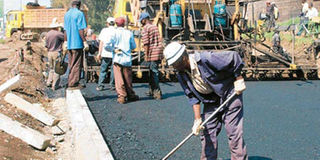Local firms to get piece of the pie in rail project

A section of the road in Nakuru being repaired by China Road and Bridge Corporation. China Road and Bridge Corporation, which has been contracted to build the landmark Sh327 billion standard gauge railway, will set aside 40 per cent of the work for local firms. FILE PHOTO / NATION
What you need to know:
- Labour, security, construction material and equipment, and living supplies among services and goods to be supplied by locals.
- the first time a “local component” provision has been expressly included as part of a project of this magnitude.
China Road and Bridge Corporation, the company contracted to build the landmark Sh327 billion standard gauge railway, will set aside 40 per cent of the work for local firms.
Under an arrangement hammered out between the company and the ministry of Transport and Infrastructure, which has a supervisory role over the project, at least the portion of materials that will be used in the project is expected to be supplied by local firms, as long as they meet the specifications set by the contractor. Initial estimates indicate that this translates into business valued at $1.5 billion.
“We will continue to make full use of local resources, including construction materials, equipment, transportation and manpower, among others,” said Julius Li, who is in charge of Corporation and Liaison Affairs at CRBC. “CRBC welcomes all qualified local partners to work hand in hand with us on the mega project, so as to deliver the project to Kenyans and the EAC region as early as possible, and build the railway of friendship between China and Kenya.”
OPPORTUNITIES FOR LOCALS
Mr Li spoke during an SGR symposium held at the Railway Training Institute in Nairobi this week. The forum brought together officials of CRBC, ministry of Transport and Infrastructure, Kenya Railways and representatives of Kenyan business, under the auspices of the Kenya Private Sector Alliance.
This is the first time a “local component” provision has been expressly included as part of a project of this magnitude. Normally, contractors are not obligated to get any portion of supplies or services from within the country and the tendency has been to go for and favour businesses that share the same domicile.
Besides labour from construction workers and security personnel and sub-contracting for related infrastructure, local firms will be expected to supply the contractor with such materials as sand, aggregate, cement, cinder, gasoline, explosives, detonators, fuses, diesel and lubricants, rebar and ancillary materials, among others.
LOAN AGREEMENT
Other opportunities for local firms will come from supplying living supplies for Chinese workers, safety and fire-fighting equipment, vehicles for management, tools, equipment, instruments and spare parts. Others are haulage, equipment leasing and construction of temporary structures, among others.
With the conclusion of the loan agreement for the SGR on May 11, 2014, between the National Treasury and Chinese Exim Bank during the state visit to Kenya by Chinese Premier Li Keqiang, it is all systems go on the project.
The endgame is a modern railway link between Mombasa and Nairobi that will eventually traverse the Northern Corridor to Kigali through Kampala. The second phase of the Kenyan leg will be between Nairobi and Malaba.
A link between Kampala and Juba, southern Sudan, is also part of the mega infrastructure project, after South Sudan got on board. The project, expected to be a regional game changer was initially started as a tripartite agreement that brought together Kenya, Uganda and Rwanda.




